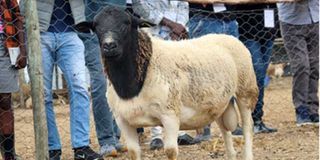How Dorper sheep rearing is gaining popularity in Nakuru County

A Dorper sheep pictured at Amagoh Farm in Kantafu along Kangundo Road on July 19, 2024.
The hardy Dorper sheep breed is rapidly gaining traction in Nakuru, renowned for its rapid growth, high-quality meat, and excellent adaptability to Kenya’s semi-arid climate. Originally from South Africa, Dorpers have proven to thrive in the region's conditions, offering a profitable alternative for commercial sheep farming.
These sheep are well-regarded for their ability to flourish on minimal feed, fast maturation, and high lambing frequency, making them a desirable choice for farmers seeking a sustainable and lucrative livestock venture.
Their rapid growth, with lambs reaching market weight in just four months, ensures quick returns on investment.
The Nakuru County government has recognised the potential of Dorper sheep and is actively working to bridge the gap in the growing demand for the breed.
Through its livestock breed improvement programme, the county has distributed 65 Dorper rams to ten farmer groups in Elementaita Ward, Gilgil Sub-County. This initiative aims to improve sheep breeds and enhance productivity in the region.
Dr Michael Cheruiyot, Chief Officer of Livestock, Fisheries, and Veterinary Services, emphasises that Dorper sheep’s efficiency in feed conversion makes them an attractive option for farmers.
“The breed is not selective about its grazing habits and thrives on poor-quality feed, reducing feed wastage,” he notes.
Historically, many farmers in Nakuru relied on recycled breeding rams, which led to undersized sheep with poor market value. However, the introduction of Dorpers is changing this narrative.
“Dorpers reach market weight quickly, and research shows they gain around 90 grammes per day. Good nutrition can accelerate this process, enabling farmers to achieve market weight even faster,” he explains.
Dr Cheruiyot adds that Dorper sheep are relatively low-maintenance, with good resistance to diseases and parasites, reducing the need for extensive care.
Their strong foraging abilities allow them to graze on a wide range of vegetation, making them ideal for extensive grazing systems in Nakuru's semi-arid regions.
Moreover, the breed’s early sexual maturity allows rams to begin breeding as early as five months old. The lambing interval of Dorper sheep is eight months, meaning farmers can expect up to three lambs every two years, or two lambs annually. The high fertility rates, coupled with a long breeding season, enable the breed to produce twins or triplets regularly. This, according to him, leads to fast-growing flocks and higher productivity.
Another advantage of the Dorper breed is its ability to be crossbred with other sheep breeds to enhance desirable traits such as wool quality or disease resistance.
Mr Newton Mwaura, Chief Officer for Agriculture, said that Dorper sheep farming presents an excellent opportunity for farmers in Kenya, offering low-maintenance care and high-quality meat production.
Dorper sheep are highly sought after for their tender, flavourful meat, which is prized by consumers. This makes them an attractive option for farmers looking to tap into premium markets.
Dorper sheep imported from South Africa can cost between Sh35,000 and Sh40,000 each. Despite their many advantages, Dorper sheep face some challenges. They are particularly susceptible to gastrointestinal nematodes (Haemonchus contortus), requiring farmers to manage parasites carefully to maintain healthy flocks.


